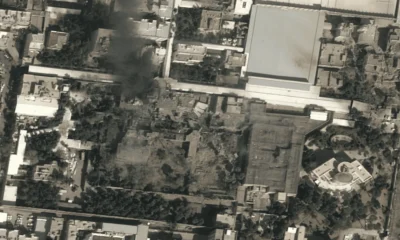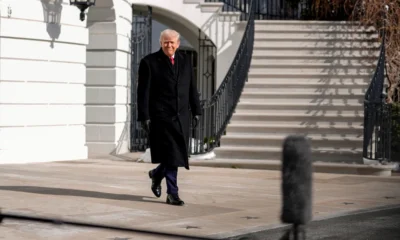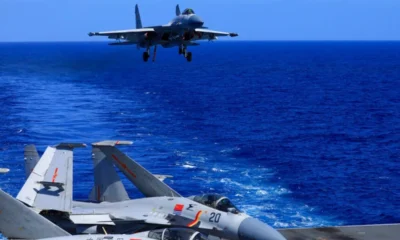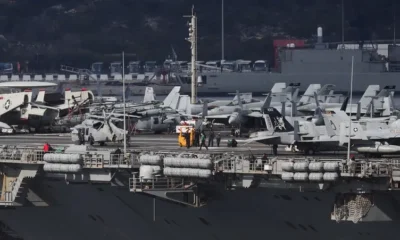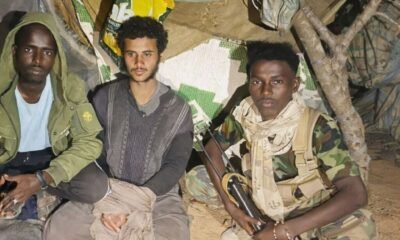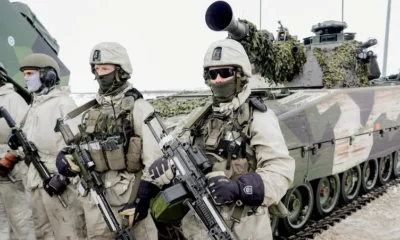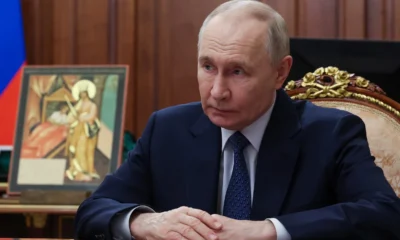Military
US-Led Military Conference in Botswana: Africa’s Defense Chiefs to Tackle Security Challenges
In a significant move towards enhancing security and stability across Africa, defense chiefs from 30 African countries will converge in Botswana next week for a two-day military conference organized by the United States Africa Command (AFRICOM). This marks the first such gathering on African soil since the inaugural conference in 2017.
“The aim is to tackle the pressing security challenges on the African continent and to find ways to work together for a safer, more secure Africa,” stated Lt. Commander Bobby Dixon, AFRICOM spokesman. The conference agenda includes discussions on counterterrorism, cyber threats, peacekeeping missions, and other critical security issues. Military leaders and experts will share insights and strategies, aiming to strengthen Africa’s collective defense capabilities.
This year’s meeting seeks to build on the successes of previous conferences, including the highly attended 2022 gathering in Rome, Italy, which saw participation from 43 countries.
Jakkie Cilliers, a political scientist at the Institute for Security Studies in Pretoria, highlighted the complexity of Africa’s security environment. “Africa faces a series of challenges. It is not always clear that the model that the U.S. presents is appropriate for Africa,” Cilliers remarked. He pointed to recent coups carried out by forces trained by Western nations and the withdrawal of UN peacekeeping missions from conflict zones like the DR Congo and Mali as significant concerns.
The conference comes at a time of shifting global power dynamics, with increasing involvement from nations like Russia and the growing role of private security companies. “Are we seeing a new model developing where African governments are considering alternative security arrangements, mostly by other African countries?” Cilliers pondered. The Gaborone conference is expected to address these issues and seek effective solutions to the continent’s multifaceted security problems.
Following a Peace and Security Council meeting in March, the African Union expressed “deep concern” over the persistent conflicts plaguing the continent and their detrimental impact on socioeconomic development. The upcoming conference in Botswana is seen as a crucial step towards a unified approach in tackling these challenges.
As defense leaders gather in Gaborone, the stakes are high for forging partnerships and developing strategies that can safeguard Africa’s future. The outcomes of this conference could pave the way for more effective security measures and a stronger collective defense posture across the continent.

Comment
Turkey’s Expanding Military Role in Somalia Raises Strategic Questions for Somaliland

Ankara says “stability.” Somaliland sees risk. The Horn of Africa is entering a new strategic chapter — and the stakes are rising fast.
When Turkish warships docked in Mogadishu, alongside reports of F-16 fighter jet deliveries and offshore drilling plans, the signal was unmistakable: Ankara is deepening its footprint in Somalia. For Somaliland — whose collective memory still carries the trauma of the 1988 bombardment of Hargeisa by the regime of Siad Barre — the optics alone are unsettling. Military expansion in Mogadishu is rarely viewed as defensive. It is viewed through history.
Yet a sober assessment of the Turkey–Somalia defense and economic framework suggests a more complex reality. Turkey is unlikely to launch — or support — an offensive campaign against Somaliland. The strategic costs would be immense.
As a key member of NATO, Ankara positions itself as a regional stabilizer, not a proxy combatant in Somalia’s internal territorial disputes. An unprovoked escalation against a relatively stable and democratic territory with informal ties to the United Kingdom, the UAE and Ethiopia would undermine Turkey’s diplomatic standing at a time when it seeks influence across Africa and the Red Sea corridor.
Economics also act as a restraint. Turkey’s maritime doctrine — often described as the “Blue Homeland” — prioritizes sea lanes, energy access and trade routes. A regional war would jeopardize precisely the offshore prospects and shipping stability Ankara hopes to cultivate. Investors do not drill in active conflict zones.
Ethiopia further complicates any military calculus. Somaliland’s memorandum of understanding with Ethiopia creates a deterrent layer Ankara cannot ignore. Turkey maintains significant economic and defense ties with Addis Ababa; it is unlikely to risk indirect confrontation over Mogadishu’s maximalist claims.
Still, the danger lies less in intent than in imbalance. Advanced aircraft in a fragile security environment introduce new variables. Even if initially deployed against Al-Shabaab, the capability itself alters regional power equations. History in Somalia has shown how quickly state assets can be redirected.
Maritime cooperation carries similar risks. If Turkish-trained Somali naval units patrol waters claimed by Somaliland — particularly near the vital Berbera corridor — even minor incidents could escalate into diplomatic crises.
The most combustible element may be energy exploration. Should Turkish drilling vessels operate in offshore blocks Somaliland considers within its jurisdiction, a commercial venture could morph into a sovereignty dispute with international implications.
Turkey is not preparing an invasion. It is consolidating influence — military, economic and maritime — in a strategically vital region. For Somaliland, the challenge is not alarmism but strategy: direct engagement with Ankara, stronger regional integration with Ethiopia, and early internationalization of maritime boundary concerns.
In the Horn of Africa, power shifts rarely announce themselves loudly. They unfold quietly — until they don’t.
Military
Ethiopia, Morocco Formalize Military Cooperation
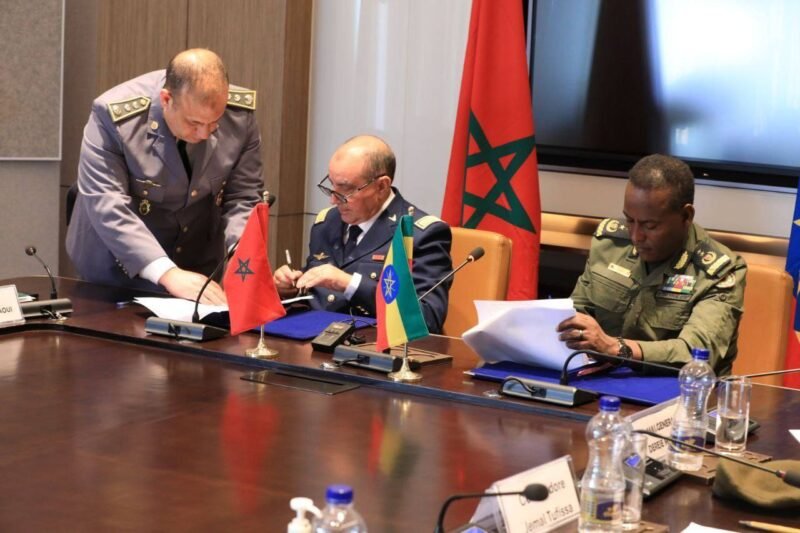
Ethiopia–Morocco Defense Axis Takes Shape in Historic First Military Talks
ADDIS ABABA / RABAT — Ethiopia and Morocco have convened their first-ever Joint Defense Committee meeting, marking a significant step toward deepening military cooperation between two of Africa’s most influential regional powers.
The talks, held Thursday, focused on expanding bilateral defense relations across a broad range of areas, including military education and training, defense industry collaboration, technology transfer, and logistical cooperation. Officials from both sides described the meeting as a foundational moment in formalizing security ties that have long been cordial but largely undeveloped at the institutional level.
Major General Teshome Gemechu, Director General of External Relations and Military Cooperation at the Ethiopian National Defense Force (ENDF), said relations between Ethiopia and Morocco have been steadily strengthening across political, economic, and security sectors.
He described the partnership as rooted in African solidarity and shared strategic interests, adding that the joint committee represents a historic milestone that opens a new phase of practical cooperation between the two defense establishments.
“This meeting creates a structured framework to translate political goodwill into concrete military collaboration,” Teshome said, emphasizing the importance of long-term institutional engagement rather than ad hoc cooperation.
On the Moroccan side, Brigadier General Abdelkahar Atmane, Director of the Quartermaster Directorate of the Royal Armed Forces, called the outcomes of the meeting a “significant development” in bilateral military relations. He said Morocco is committed to elevating defense cooperation with Ethiopia and expressed satisfaction with the progress achieved so far.
Atmane also revealed that Morocco has initiated steps to begin utilizing Ethiopian defense supplies, noting that implementation of this initiative is expected to start in the near future — a move that signals growing trust and interoperability between the two forces.
The establishment of the Joint Defense Committee comes amid broader shifts in Africa’s security landscape, as countries increasingly seek diversified partnerships, indigenous defense capabilities, and South–South cooperation outside traditional Western security frameworks.
For both Addis Ababa and Rabat, the meeting underscores a shared ambition to position themselves as stabilizing forces in their respective regions while strengthening intra-African defense coordination.
Maritime Security
Anduril’s $1.1bn Deal Boosts Australia’s Undersea Defence Industry

U.S. defence firm Anduril Industries opened a Sydney factory this week to build its “Ghost Shark” autonomous undersea vehicles, a tangible milestone in Australia’s push for sovereign maritime capability.
The A$1.7 billion ($1.1 billion) program — awarded in September to co-develop a fleet for the Royal Australian Navy — signals Canberra’s growing appetite for unmanned systems that can patrol littoral waters, deter aggression, and extend surveillance without putting sailors at direct risk.
Anduril says the first Ghost Shark is complete and ready for in-water trials ahead of a January delivery. The 7,400-square-metre plant will scale to full production in 2026 and create roughly 150 skilled jobs, while more than 40 local suppliers will feed parts into the programme.
For Australia, that supply-chain angle matters as much as the hardware: domestic manufacturing reduces reliance on foreign suppliers, creates political capital at home, and opens an export pathway to allies — subject, of course, to Canberra’s export controls.
Strategically, Ghost Sharks fit a wider logic. Australia faces an intensifying maritime environment in the Indo-Pacific where seabed sensors, unmanned surface vessels, and autonomous underwater systems increasingly define naval competition.
Autonomous systems can operate persistently, collect acoustic and electronic intelligence, and create layered defense zones around critical ports and sea lines of communication.
That matters for Australia’s deterrence posture in the face of sophisticated undersea capabilities deployed by regional peers.
But delivered capability will hinge on integration. Fielding dozens of underwater drones is not merely a procurement exercise; it requires doctrine, secure communications, maintenance networks, and robust rules of engagement to avoid accidents or escalation.
Interoperability with existing naval platforms and allied forces will determine whether Ghost Sharks are a niche tool or a force-multiplying node in a distributed maritime architecture.
There are also political tradeoffs. Building military kit locally brings jobs and industrial resilience, yet it raises questions about export controls, technology transfer, and alliance dependency if critical components remain foreign-sourced.
Anduril’s Sydney plant promises local content, but Canberra must guard against hollow sovereignty — factories onshore that still depend on offshore supply and design authority.
If the in-water tests succeed and the factory hits its stride in 2026, Australia will have a credible path to fielding persistent undersea autonomy at scale.
That outcome would mark a turning point: not just in capability, but in how democracies build resilient defence industries for the age of unmanned warfare.
Military
US Approves $1 Billion Missile Sale to Finland Amid Rising Russia Tensions
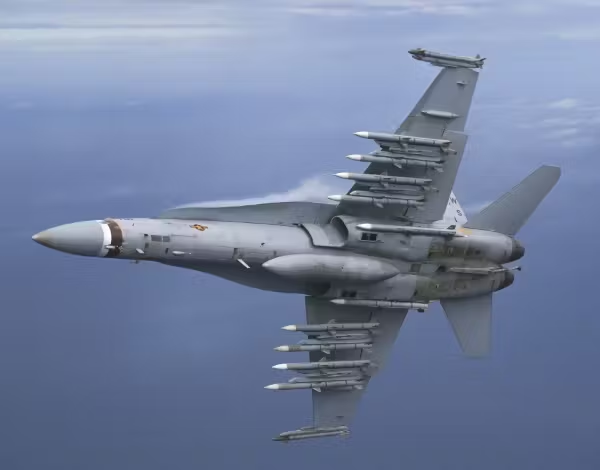
The United States has approved the sale of more than $1 billion in advanced air-to-air missiles to Finland, a move underscoring deepening defense ties with NATO’s newest member as the alliance braces for continued confrontation with Russia.
The $1.07 billion package includes dozens of AIM-120 Advanced Medium-Range Air-to-Air Missiles (AMRAAM) and associated equipment, according to the Defense Security Cooperation Agency (DSCA). The proposed deal still requires congressional approval but is not expected to face significant opposition.
“The sale will improve Finland’s capability to meet current and future threats and enhance its interoperability with U.S. and allied forces,” the DSCA said in a statement. “It will also support the foreign policy and national security objectives of the United States by strengthening the security of a NATO ally that is a force for political stability and economic progress in Europe.”
Finland abandoned decades of military nonalignment and joined NATO in April 2023, following Russia’s full-scale invasion of Ukraine. Its accession instantly doubled the length of NATO’s direct border with Russia, turning the country of 5.6 million into a frontline state in Europe’s security architecture.
Since then, Helsinki has rapidly expanded its defense spending and sought closer integration with Western weapons systems. The missile purchase, analysts say, will bolster Finland’s F-35 fighter fleet and tighten interoperability with other NATO air forces at a time when Russian drone and missile attacks in Eastern Europe are escalating.
The sale also reflects Washington’s determination to arm allies positioned on NATO’s northeastern flank, where leaders warn that Russian President Vladimir Putin could test the alliance’s defenses in the coming years.
For Finland, which shares an 830-mile border with Russia, the deal is not only about modernizing its arsenal but also about signaling deterrence.
Congress now has 30 days to review the transaction.
Comment
China’s Space Grab in Africa: How Beijing Is Winning the Final Frontier as Trump Slashes U.S. Aid

While Trump retreats, China plants its flag in Africa’s skies—building satellites, telescopes, and alliances to dominate space and surveillance.
As Trump guts foreign aid, China ramps up space partnerships across Africa, embedding surveillance tech and satellites that could shift the balance in the global space race—and military power.
Space for Sale: How China Is Colonizing Africa’s Skies as America Pulls Back
While the United States under President Trump slashes development aid and scales down soft power, China is quietly launching a space takeover in Africa—one satellite, telescope, and military-grade surveillance system at a time.
From a space lab outside Cairo to high-powered telescopes tracking orbital objects from Egyptian hilltops, China is embedding itself deep into Africa’s burgeoning space infrastructure. Beneath the banner of cooperation and development, Beijing is not just gifting technology—it’s harvesting data, expanding its global surveillance network, and establishing a strategic military and political footprint across the continent.
This is no secret to Washington. Intelligence veterans like Nicholas Eftimiades warn that China is “democratizing space to enhance its authoritarian capabilities”—a global dragnet cloaked in diplomacy. And it’s working. More than 23 African nations now partner with China on space ventures, from satellite launches and ground stations to a proposed joint moon base that openly rivals NASA’s Artemis program.
The Space City outside Cairo, where Chinese engineers outnumber locals, is emblematic. The “African-built” satellites launched there? Mostly assembled in China. Data ownership? Officially Egyptian—but insiders say Beijing still taps into the stream. It’s not just soft power—it’s hardware dominance with military consequences, including anti-satellite warfare readiness and real-time surveillance of joint U.S.-Egyptian exercises.
As China builds eyes in the sky, Trump’s America is going dark—cutting U.S. Agency for International Development funds and retreating from space diplomacy. Meanwhile, SpaceX’s Elon Musk races ahead in military-grade satellite networks, but there’s little sign of the U.S. competing with China’s ground-level infiltration across Africa.
The result? A Cold War-style showdown in orbit, with Africa as the battlefield—and Trump’s retreat from development aid and soft power may have handed Beijing the launch codes for a new global order in space.
China isn’t just investing in Africa—it’s outsourcing its space program onto the continent, collecting data, projecting power, and rewriting the rules of 21st-century dominance. The moon may be next, but the race is already raging here on Earth. And right now, Beijing is winning.
Military
Putin Orders Russia to Boost Size of Army by 180,000 Troops to 1.5 million
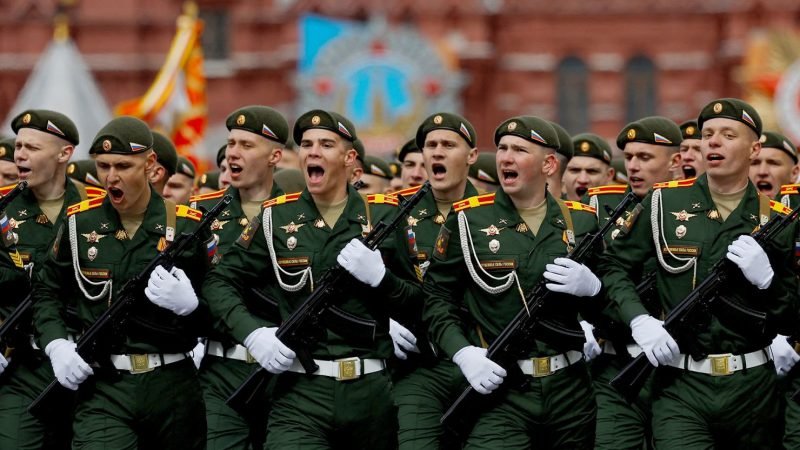
With an Increase of 180,000 Troops, Russia’s Military Expansion Stirs Controversy Amidst Rising Casualty Rates and Ukrainian Advances
President Vladimir Putin has decreed a significant expansion of the nation’s armed forces, commanding an increase of 180,000 troops. This latest order marks the third expansion since the onset of Russia’s invasion of Ukraine in February 2022, pushing the total number of Russian military personnel to an astonishing 2.4 million, including 1.5 million active troops. The new deployment will come into effect this December, as outlined in a decree published by the Kremlin on Monday.
This sweeping increase in troop numbers follows a particularly intense period of conflict. Last month, Ukraine launched a bold offensive into Russia’s southern Kursk region, marking the first foreign incursion into Russian territory since World War II. In response, Russia has intensified its military operations, aiming to drive Ukrainian forces out of Kursk and advance toward the strategic Ukrainian town of Pokrovsk in the eastern Donbas region.
Since the start of the invasion, Putin has overseen two previous expansions of military forces. In August 2022, he ordered an increase of 137,000 troops, raising the total number to just over 2 million personnel. This was followed by a partial mobilization in September 2022, which saw military reservists and citizens with combat experience drafted into service. The mobilization, which led to a mass exodus of Russian nationals seeking refuge in neighboring countries, was suspended in November 2023 after the target of 300,000 recruits was reportedly achieved.
In December 2023, Putin ordered another increase of 170,000 troops, bringing the total to 1.32 million active personnel. Despite these measures, the true extent of Russian military losses remains veiled in secrecy. Russian Defense Minister Sergei Shoigu reported 5,937 fatalities in September 2022, but no updated figures have been disclosed since.
In stark contrast, Ukrainian and Western intelligence estimates suggest far higher casualties. The General Staff of Ukraine’s military reported that Russia has lost approximately 616,300 troops, while the UK’s Ministry of Defense estimates losses exceeding 610,000. The dire situation is compounded by a high daily casualty rate, which is projected to average over 1,000 per day throughout September 2024 as Russia engages in extensive operations from Kursk in the north to Robotyne in the south.
Putin’s latest decree underscores a desperate bid to fortify Russia’s military presence amidst relentless Ukrainian resistance and mounting casualties. As the conflict drags on, the world watches closely to see how these massive troop increases will impact the ongoing war and the broader geopolitical landscape.
Military
As Global Powers Battle Over AI in Warfare, Who Will Define the Rules?

AI’s Battlefield: The Race to Control Military’s New Frontier
The world is on the brink of a high-stakes showdown over artificial intelligence (AI) in warfare, with the specter of a new arms race looming large. The 2020s have ushered in an era of unprecedented transformation, where AI’s dual-use nature—serving both civilian and military purposes—has sparked urgent debates about global governance. As nations scramble to integrate AI into their defense systems, the quest to regulate this powerful technology has never been more critical—or more contentious.
The integration of AI into military operations is akin to the advent of nuclear weapons, raising fears of doomsday scenarios and global instability. The urgency for a unified framework to govern military AI is palpable, as countries race to secure their technological edge. Despite some progress, such as the European Union’s AI Act and a UN General Assembly resolution, these initiatives fall short of addressing the rapid pace of AI development in warfare.
Since 2023, two significant frameworks have emerged: the REAIM Summit and the U.S.-led Political Declaration. The REAIM Summit, a Dutch-South Korean initiative, represents a bottom-up approach. It’s a sprawling attempt to gather 2,000 participants from 100 countries to debate and shape norms for military AI. The “Call to Action” from this summit aims to create a comprehensive framework through regional workshops and further discussions in Seoul in 2024. Its inclusive stance is meant to foster global collaboration but could lead to slow, fragmented progress.
In contrast, the U.S. Political Declaration is a top-down approach, directly addressing sovereign states. Launched in February 2024, it’s backed by 54 countries, including nearly all EU member states. The declaration outlines ten measures and six pledges to regulate military AI. Yet, its effectiveness is in question, given potential shifts in U.S. leadership and the geopolitical tensions with China and Russia. Both superpowers view AI as a game-changer, with Russia accelerating its AI efforts despite ongoing conflict in Ukraine, and China eyeing AI as a strategic asset in its regional ambitions.
The challenge of achieving a universally agreed-upon convention is daunting. The rapid evolution of AI outpaces traditional arms control measures, making prolonged negotiations seem futile. While the REAIM Summit provides a platform for broader engagement, the Political Declaration serves as a pragmatic, albeit less ambitious, attempt to set international norms. However, the lack of support from major powers and the Global South complicates the process.
Europe, despite lagging behind the U.S., China, and Russia in military AI, has a pivotal role to play. The EU’s Defence Innovation Office in Kiev highlights its commitment to understanding and leveraging military AI insights. For Europe, the stakes are high. By aligning with REAIM and advocating for the Political Declaration, Europe could play a crucial role in shaping a global governance framework for military AI, potentially tempering the rise of a new arms race.
As the global community grapples with the implications of military AI, the urgency for effective regulation is undeniable. Europe must lead the charge in making military AI governance a priority, balancing the ambitions of the REAIM Summit with the practicalities of the Political Declaration. The question remains: can the world’s powers find common ground before the technology they seek to control accelerates beyond their grasp?
Congress’s War on China: Biotech, Drones, and Farmland Under Siege
Editor's Pick
US Intel Unveils Russian Military’s Hidden Role with Houthis in Yemen
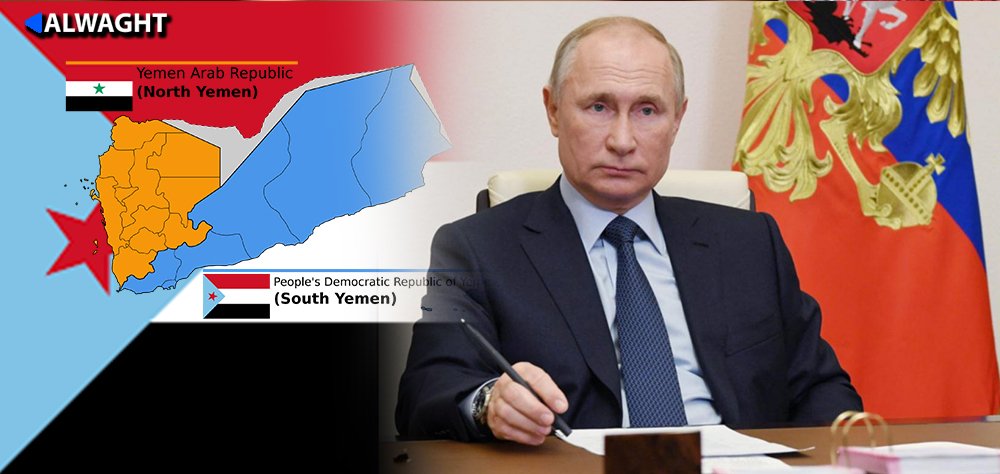
GRU Officers Advising Iran-Backed Rebels on Red Sea Maritime Attacks
US intelligence suggests that Russian military intelligence officers, specifically from the GRU, have been operating within Houthi-controlled regions of Yemen. Their mission? To aid the Iran-backed Houthis in targeting commercial vessels in the Red Sea. This covert operation has been ongoing for several months, a senior US official disclosed under the condition of anonymity.
The precise nature of the GRU’s involvement remains shrouded in secrecy, but their advisory role is clear. The Houthis, claiming solidarity with besieged Palestinians in Gaza, have intensified their attacks on maritime targets, drawing on Russian expertise to bolster their campaign.
This development signals Russia’s deepening ties with the Houthis, a move that could reshape the balance of power in the region. Earlier this year, President Vladimir Putin contemplated arming the Houthis with advanced anti-ship cruise missiles, a plan thwarted only by Saudi Crown Prince Mohammed bin Salman’s intervention. Yet, concerns linger in Washington that Putin might still use the Houthis as leverage against US policies, especially concerning Ukraine.
Samuel Ramani, a renowned expert on Russia’s Middle Eastern policies, suggests that deploying technical advisors might be Putin’s middle ground, allowing him to deepen cooperation without overtly escalating military support. The move aligns with Russia’s broader strategy of embedding itself in regional conflicts, as seen with its mercenaries in Libya and military presence in Syria.
The timing of this revelation is critical. The Houthis have ramped up missile and drone attacks on commercial vessels since Hamas’ assault on Israel on October 7th. While US retaliatory strikes on the Houthis have been ineffective, the group’s attacks have been selective, sparing ships linked to Russia, Iran, and China. This selective targeting underscores the Houthis’ maritime intelligence limitations and their reliance on open-source data, further highlighting the need for GRU expertise.
Publicly, Russia’s engagement with the Houthis has become more visible. In July, Putin’s deputy foreign minister met with a Houthi delegation in Moscow, signaling a closer alliance. The US anticipates that Iran’s “axis of resistance,” which includes the Houthis, will play a pivotal role in any retaliatory actions against Israel.
Former US officials suggest that Putin might view the escalating Middle East tensions as an opportunity to pressure the US, drawing a parallel between Ukraine’s attacks on Russian vessels in the Black Sea and potential Houthi actions in the Red Sea. General Frank McKenzie, ex-commander of US Central Command, hinted that Putin could see this as a form of “Red Sea payback.”
Despite the mounting evidence, official responses from the White House and the Department of Defense remain absent. The US intelligence community, however, is on high alert, closely monitoring the situation as the geopolitical stakes in the region continue to rise.
Russia’s strategic maneuvering in Yemen is part of a broader pattern. With the Wagner Group’s activities in Libya and the Sahel, and military deployments in Syria, Russia’s footprint in the Middle East is expanding. The potential for a Russian naval base in Sudan’s Red Sea coast only adds to this intricate geopolitical web.
In this complex game of power and influence, Putin’s decision to place GRU officers in Yemen reflects a calculated move to enhance the Houthis’ operational capabilities while safeguarding Russian interests in the Red Sea. As tensions escalate, the world watches closely, bracing for the potential fallout from this clandestine collaboration.
-

 Somaliland1 month ago
Somaliland1 month agoF-35s Over Hargeisa: The Night Somaliland’s Sovereignty Went Supersonic
-

 Somalia1 month ago
Somalia1 month agoAid Destroyed, Trust Shattered: Somalia Loses U.S. Support for Good
-

 Terrorism1 month ago
Terrorism1 month agoForeign ISIS Pipeline Exposed: Puntland Captures Dozens of Non-Somali Fighters
-

 Somaliland1 month ago
Somaliland1 month agoSomaliland at Davos: The Moment Somaliland Entered the World’s Inner Circle
-

 Terrorism1 month ago
Terrorism1 month agoAmerica Pulls Back From Somalia but Doubles Down Next Door
-

 Top stories2 months ago
Top stories2 months agoSomali Pirates Hijack Chinese Fishing Vessel off Puntland Coast
-

 Middle East2 months ago
Middle East2 months agoUS War Plans Against Iran Enter Advanced Stage
-
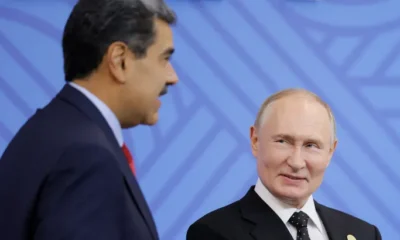
 Analysis2 months ago
Analysis2 months agoWhy Putin Is Silent on Maduro’s Abduction—and the Limits of Putin’s Power

